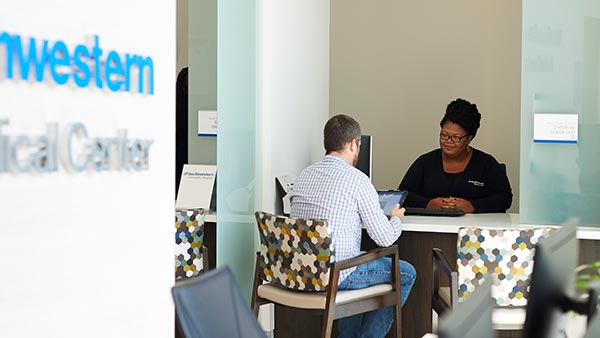Progressing Therapeutic Options for Chronic Lymphocytic Leukemia
August 10, 2020
Clinical Breakthroughs in CLL Treatment at UTSW
As an academic medical center, UT Southwestern offers clinical trials that give eligible patients access to the newest therapies. Learn more about clinical trials at UT Southwestern.
Molecular testing, novel therapies, and clinical trials might lead to improved outcomes for patients.
The treatment landscape of chronic lymphocytic leukemia (CLL) has seen remarkable change in recent years as many new treatment options arrived, including anti-CD20 antibodies, chemoimmunotherapy combinations, and targeted therapies. [1] As the role of cytotoxic chemotherapy continues to decline, the use of novel therapies is rising rapidly. [2] Additionally, several trials are underway to evaluate the feasibility of various investigational agents in the treatment of CLL. [1]
UT Southwestern provides comprehensive care with full access to the newest therapies, molecular testing, and clinical trials. We have an expert inpatient care team, and our patients are followed every step of the way through our multidisciplinary outpatient programs.
Novel Agents
Historically, the standard of care for previously untreated CLL patients in the front-line setting has been chemoimmunotherapy combinations. These time-limited options, specifically the FCR (fludarabine, cyclophosphamide, rituximab) regimen, resulted in durable remissions, especially in patients with good risk IGHV-mutated disease, but are associated with substantial toxicities and secondary malignancies. Large, multicenter phase 3 trials have also recently demonstrated the superiority of targeted therapy over chemoimmunotherapeutic regimens, further limiting their utility. [1-5]
“Our patients have access to state-of-the-art, in-house mutational testing, which is critical for assessing prognosis and selecting appropriate therapies. Access to these resources helps ensure our patients receive the best possible management of their condition and have the best possible outcomes.”
Farrukh Awan, M.D.
Ibrutinib and acalabrutinib, approved as BTK inhibitors by the U.S. Food and Drug Administration, have demonstrated superiority over chemoimmunotherapy-based regimens. [3,4] These agents are generally better tolerated and can be continued until disease progression and/or unacceptable toxicities occur. Moreover, the addition of monoclonal antibodies to BTK inhibitors can potentially improve response rates, but improvement in progression-free survival has not been established. Additionally, venetoclax is a BCL-2 inhibitor that has shown promising efficacy both in patients with previously untreated disease and relapsed disease, including patients with disease resistant to BTK inhibitors. [6] Additionally, the combination of venetoclax with either rituximab or obinutuzumab provides a time-limited treatment option without chemotherapy and results in deep remissions that can be sustained, it is hoped, for a long duration. Recent data also demonstrate the utility of ibrutinib in patients with disease refractory to venetoclax. At present, the data are largely based on findings from observational studies, further supporting the need for randomized studies to confirm optimal sequencing of therapy. [1]
Many of these novel agents are continued indefinitely until disease progression or development of intolerable side effects. Efforts are underway to develop and test strategies in clinical trials that would allow combining various novel agents in an attempt to limit duration of therapy without compromising disease control.
Our program at UT Southwestern also provides access to state-of-the-art comprehensive molecular testing, including for IGHV and TP53 mutational status. Our patients also have access to whole exome and germline next-generation sequencing. As the treatment landscape evolves, the clinical utility of predictive biomarkers is important to help inform prognosis and treatment selection. Moreover, availability of minimal-residual disease testing allows evaluation of treatment efficacy and is being used more frequently as a tool for guiding decisions to discontinue treatment. [1,5]
Our patients have access to state-of-the-art, in-house mutational testing, which is critical for assessing prognosis and selecting appropriate therapies. Access to these resources helps ensure our patients receive the best possible management of their condition and have the best possible outcomes.
Future Directions
Our team at UT Southwestern is actively leading the development of next-generation BTK inhibitors. One example is ARQ 531, which is designed to overcome common mechanisms of ibrutinib resistance by targeting alternative sites in the BTK molecule. This promising drug candidate is being evaluated in the setting of ibrutinib-resistant CLL. [7]
We anticipate that second-generation BTK inhibitors will demonstrate efficacy even in patients with documented BTK resistance. We have already treated several patients in our ARQ 531 trial and have noted promising responses and good tolerability.
Because we are one of the few institutions recognized by the National Cancer Institute as a Comprehensive Cancer Center, our patients have unique access to a wide range of clinical trials, with the potential to access investigational therapies not available elsewhere. In addition, our hematologic malignancies and stem cell transplantation program has excellent survival outcomes with low rates of morbidity and mortality, thanks to our disease-specific multidisciplinary care teams. [8]
About the Author
Farrukh Awan, M.D., Associate Professor in the Department of Internal Medicine at UT Southwestern Medical Center, is a renowned expert in the diagnosis and treatment of patients with CLL. He and his team are pioneering the development of innovative therapies as part of ongoing clinical trials at the institution.
Footnotes
1. Hallek M. Chronic lymphocytic leukemia: 2020 update on diagnosis, risk stratification, and treatment. Am J Hematol. 2019;94(11):1266-1287.
2. Jacobs RW, Awan FT, Leslie LA, Usmani SZ, Ghosh N. The shrinking role of chemotherapy in the treatment of chronic lymphocytic leukemia. Expert Rev Hematol. 2016;9(12):1177-1187.
3. Shanafelt TD, Wang XV, Kay NE, et al. Ibrutinib-rituximab or chemoimmunotherapy for chronic lymphocytic leukemia. N Engl J Med. 2019;381(5):432-443.
4. Woyach JA, Ruppert AS, Heerema NA, et al. Ibrutinib regimens versus chemoimmunotherapy in older patients with untreated CLL. N Engl J Med.2018;379(26):2517-2528.
5. Hallek M, Cheson BD, Catovsky D, et al. iwCLL guidelines for diagnosis, indications for treatment, response assessment, and supportive management of CLL. Blood. 2018;131(25):2745-2760.
6. Roberts AW, Davids MS, Pagel JM, et al. Targeting BCL2 with venetoclax in relapsed chronic lymphocytic leukemia. N Engl J Med. 2016;374(4):311-322.
7. Reiff SD, Mantel R, Smith LL, et al. The BTK inhibitor ARQ 531 targets ibrutinib-resistant CLL and richter transformation. Cancer Discov. 2018;8(10):1300-1315.
8. utswmed.org. Leukemia: Harold C. Simmons Comprehensive Cancer Center. Accessed February 17, 2020.






